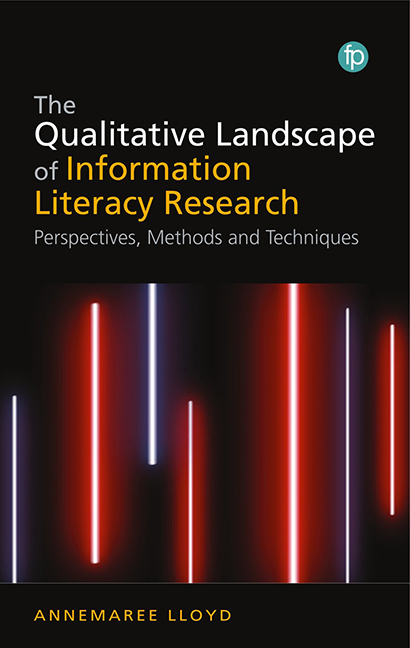Book contents
- Frontmatter
- Contents
- Figures
- Foreword
- Acknowledgements
- Introduction: The Qualitative Landscape of Information Literacy Research
- Chapter 1 Situating Information Literacy Research
- Chapter 2 Informing Information Literacy Research
- Chapter 3 Framing Information Literacy as an Educational Practice for Research. Learning Theories and Models
- Chapter 4 Qualitative Methods in Information Literacy Research
- Chapter 5 Collecting Data About Information Literacy: Data Collection Techniques
- Chapter 6 Planning for Research
- Chapter 7 Qualitatively Speaking and Doing Information Literacy Research
- References
- Index
Foreword
Published online by Cambridge University Press: 21 October 2021
- Frontmatter
- Contents
- Figures
- Foreword
- Acknowledgements
- Introduction: The Qualitative Landscape of Information Literacy Research
- Chapter 1 Situating Information Literacy Research
- Chapter 2 Informing Information Literacy Research
- Chapter 3 Framing Information Literacy as an Educational Practice for Research. Learning Theories and Models
- Chapter 4 Qualitative Methods in Information Literacy Research
- Chapter 5 Collecting Data About Information Literacy: Data Collection Techniques
- Chapter 6 Planning for Research
- Chapter 7 Qualitatively Speaking and Doing Information Literacy Research
- References
- Index
Summary
This is a landmark book. When a book such as this arrives on the actual or virtual shelves it demonstrates that a subject area has come of age. Annemaree Lloyd has brought together the most important methods and techniques in qualitative research for information literacy into this new volume. What marks this work out from others is the numerous examples included from information literacy research which enable the reader/researcher to further pursue their interests. Equally valuable is that Annemaree emphasises that it is the research question or problem that drives the methodology and methods that follow. The explanations of research philosophies, paradigms, method - ologies, methods and techniques and how they relate is second to none in this welcome addition to our research toolbox.
But why is qualitative research so valuable? I thought I would describe an incident which alerted me to the significance and the richness of carrying out qualitative analysis and how it can get beyond the numbers to create a rich narrative of the subject you are researching. It is these ‘rich narratives’ which give us in-depth insights into the participants or subject we are researching. For me this was my first piece of ‘real’ information science research. It was my PhD which provided me with an abiding motivation to continue with qualitative research for the rest of my career.
In the initial stages of my PhD on information literacy, longer ago than I care to remember, I recall that I was fixated on garnering numerical data for my thesis, thinking it was superior in quality to a bunch of quotes. How utterly wrong I was. The qualitative data I gathered through actually talking to people revealed insights and issues I had not thought of. It also gave a deep and nuanced meaning which the numerical data could never unearth.
I had asked students to tell me what they thought of the information literacy reflective practice exercise I had given them – thinking they would have loved every minute of it. They were very honest! They took me aback to be frank. The insights were hard to take at first but deeply revealing. Learners were asked what they thought about reflective practice and collaborative learning.
- Type
- Chapter
- Information
- The Qualitative Landscape of Information Literacy ResearchPerspectives, Methods and Techniques, pp. xi - xiiPublisher: FacetPrint publication year: 2021

